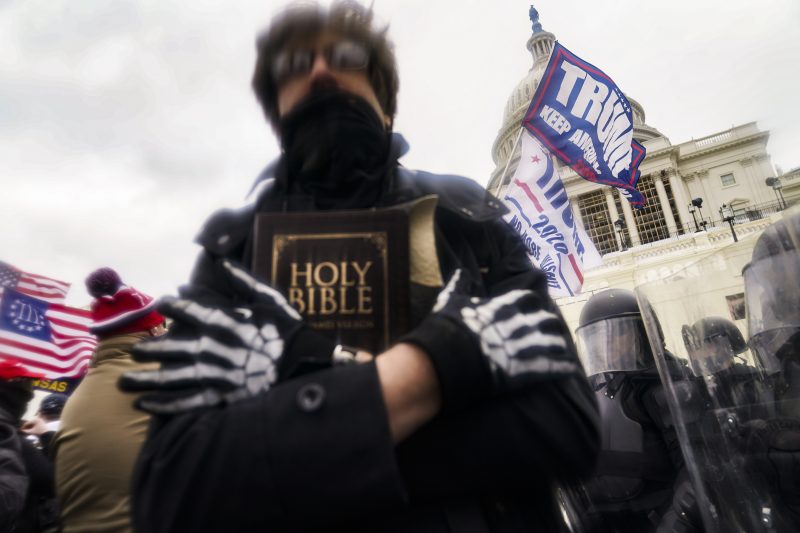A federal appeals court has for the second time upheld the lead felony charge used against participants in the 2021 Capitol riot, a ruling that has implications for former president Donald Trump and hundreds of other defendants.
Thomas Robertson, a former police officer convicted at trial of obstruction of Congress and other charges last year, argued on appeal that he earnestly believed the 2020 election was stolen and so was acting honestly, not corruptly, when he stormed the Capitol to stop the results from being certified. The charge is one of the four that Trump faces in the same courthouse, and his lawyers have voiced the same defense — that Trump thought the election was stolen and had no corrupt intent.
The appellate court ruled that “there are multiple ways to prove that a defendant acted ‘corruptly,’” and requiring dishonesty “is at odds with the view of that term taken by the Supreme Court, this court, and Congress.” The opinion was written by Florence Pan, a Biden appointee, and joined by Cornelia Pillard, an Obama appointee. Karen Henderson, a George H.W. Bush appointee, dissented.
In advance of Jan. 6, Robertson said he was ready for “open armed rebellion.” He came to D.C. with a gas mask and a large wooden stick, which he used to swipe at police guarding the building. Inside, he pounded the floor with the stick as the crowd chanted around an outnumbered group of officers. Days later, Robertson celebrated on social media, saying that “we actually attacked the government who is the problem.” He then destroyed his phone.
The appellate court ruled that Robertson’s behavior was corrupt because in pursuing his goals, he “broke the law in multiple ways.” Along with obstruction, he was convicted by a jury of impeding police and destroying evidence, and was sentenced to 87 months in prison.
“This case does not present a close question of culpability,” the court wrote.
Another Jan. 6 defendant, whose only felony conviction was for obstruction, is also appealing on the grounds that his behavior was not corrupt. That case is pending. Friday’s opinion said that while separate felony convictions are sufficient to show corruption, they are not necessary, and it would set aside the question of other ways of proving corruption for now.
As of this month, the Justice Department says more than 317 people have been charged with obstructing Congress as a result of Jan. 6 actions.
Robertson also argued that the Justice Department is in danger of criminalizing political advocacy in violation of the First Amendment. The court wrote Friday that it was not concerned by that possibility, because peaceful lobbying and protest “do not fit the ordinary meaning of ‘corruptly,’” and “the electoral-vote certification by Congress is not a policymaking exercise” open to such campaigns: “It is a constitutionally scripted transition of presidential power, with an outcome determined by the results of a presidential election.”
The obstruction law was designed to close a loophole exposed by the Enron scandal, and Jan. 6 defendants have also argued that it was meant to cover only evidence-tampering and not mob riots. An appellate court rejected that argument this year. But the panel split over the question Robertson raised — what counts as “corrupt” obstruction of Congress as opposed to mere protest. One judge, Trump appointee Justin Walker, argued that corrupt intent requires attempting to garner an “unlawful benefit” for yourself or someone else.
This court rejected that definition as too limited and dismissed Walker’s contention that, as the narrowest option, his interpretation was binding on trial judges. But the majority also said Robertson’s conviction would stand either way, because there was enough evidence “that Robertson intended to secure the unlawful benefit of installing the loser of the presidential election, Donald J. Trump, as its winner.”
In dissent, Henderson said that Walker’s view was both correct and binding, and that Robertson’s conduct did not qualify because he “merely intended to protest the outcome of the election.”
A similar dispute doomed the conviction that inspired the obstruction charge. Enron accounting firm Arthur Andersen was found guilty at trial of “corruptly persuading” others to destroy evidence of the energy company’s fraud, because there was no straightforward crime at the time of obstructing a government investigation that targets someone else. But the U.S. Supreme Court overturned that conviction, unanimously agreeing that the jury was not told that “corruptly” must mean with “consciousness of wrongdoing.”
Jurors in Robertson’s case were given that instruction and told that the crime must involve “unlawful means” or “a wrongful or an unlawful purpose.” The court said Friday that “it is not apparent” the “consciousness of wrongdoing” instruction was necessary here, because unlike that law, there is no requirement in the obstruction of Congress charge that the corruption be committed “knowingly.”








